
CONTENTS
2. Important Event: The Birth and Spread of Islam
6. Answer Keys
1. IN THE NEWS THIS WEEK

Important note: This is just a sample of news items from this week. Often, more important events have taken place, affecting many more people than the events chosen for this section. The editor hopes to limit news about death and destruction. Since this is an educational resource, we also hope to focus on useful vocabulary.
News item #1: Virginia’s Democratic senator Tim Kaine proposes legislation to stop U.S. President Donald Trump from using military force against Iran without authorization from Congress.
Vocabulary
legislation (n.): laws that are made and passed by a government
Example: The new legislation will improve safety standards in factories.
military force (adj.+n.): organized armed soldiers who fight for a country
Example: The president decided to send a military force to protect the border.
authorization (n.): official permission to do something
Example: You need authorization before entering the restricted area.
News item #2: Thai police conduct a raid on a house in Samut Prakan, Thailand, arresting 13 foreigners, primarily Australians and British citizens, for operating a fraudulent electronic trading platform that stole over AU$1.9 million (US$1.2 million).
Vocabulary
conduct a raid (v.+n.): to make a surprise attack or search, usually by police or soldiers
Example: Police will conduct a raid on the warehouse to look for stolen goods.
(to) operate (v.): to control or use a machine, system, or process
Example: She knows how to operate the new computer system.
fraudulent (adj.): dishonest and meant to trick someone for illegal gain
Example: The company was shut down because of its fraudulent business practices.
electronic trading platform (adj.+n.): a computer-based system where people buy and sell financial products
Example: Investors can use the electronic trading platform to buy and sell stocks.
News item #3: Ukraine’s parliament passes a law permitting multiple citizenship for Ukrainians to address a demographic crisis triggered by the Russian invasion.
Vocabulary
parliament (n.): a group of elected officials who make laws for a country
Example: Parliament will vote on the new tax law next week.
multiple citizenship (adj.+n.): the status of being a citizen of more than one country at the same time
Example: Some people have multiple citizenship if they were born in one country and moved to another.
(to) address (v.): to give attention to a problem or issue; or to speak directly to someone
Example: The mayor will address the community about the recent storm damage.
demographic crisis (adj.+n.): a serious situation caused by major changes in a population’s size, age, or structure
Example: Many countries face a demographic crisis due to declining birth rates.
2. IMPORTANT EVENT: The Birth and Spread of Islam
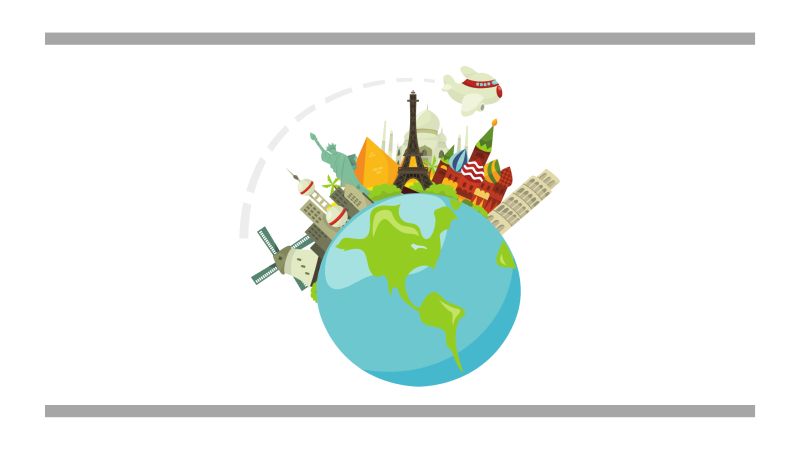
Video
Summary
Islam was founded in the 7th century by Prophet Muhammad in Mecca. It spread rapidly across Arabia, reaching as far as Spain and India within a century of Muhammad’s death. The migration to Medina in 622 AD is considered the birth of Islam as a political and religious entity. Islam’s growth resulted from conquests, as well as the efforts of merchants and scholars who disseminated the religion and culture globally. Today, Islam is the second-largest religion with over 1.8 billion followers, influencing various aspects of culture, art, science, and politics worldwide.
Facts
- Founded by Prophet Muhammad in the 7th century in Mecca.
- Muslims believe Muhammad received revelations from Allah through the angel Gabriel, recorded in the Quran.
- Muhammad and his followers migrated to Medina in 622 AD, marking the beginning of Islam as a political and religious entity.
- Within a century of Muhammad’s death, Islam reached Spain in the west and India in the east.
- Islam expanded through conquests, as well as efforts by merchants and scholars.
- Rapid expansion contributed to the establishment of a vast Islamic empire.
- Islam influenced culture, art, science, and politics globally.
- Islam is the second-largest religion in the world with over 1.8 billion followers.
Vocabulary Exercise
Read the definitions of words and phrases. Then complete each sentence with one of the bold words or phrases.
- monotheistic religion: a belief system that acknowledges the existence of only one god
- (to) face opposition: to encounter resistance or disagreement from others
- ruling class: a social group or elite that holds significant political or economic power and influences decision-making
- (to) rapidly spread: to quickly disseminate or extend over a wide area or among a large group of people
- within a century / decade / week / day / hour (of): indicates the timeframe within which a particular event occurred or is expected to occur
- significant impact (on): a substantial and influential effect on a particular situation or outcome
- The ___________________ often determines policies and shapes the direction of a nation.
- _____________________ of the invention of the internet, it became a ubiquitous part of daily life.
- News of the discovery ___________________ through social media.
- Social reformers often ____________________ from those resistant to change.
- Christianity, Islam, and Judaism are examples of ________________________.
- Changing your diet and exercising regularly have a _____________________ on your health.
(Audio included with the answer key at the end of this lesson)
Are you enjoying this lesson? Support us to keep it free for everyone – click on the “Donate” button …
… or go to this page:
https://donorbox.org/english-class-this-week
3. THIS WEEK IN HISTORY
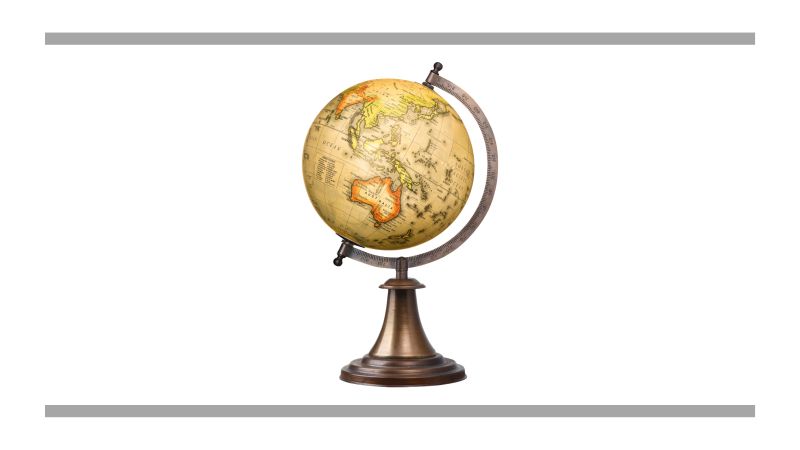
June 16, 1976: The Soweto Uprising, a student-led protest against apartheid education policies, begins in South Africa, galvanizing the anti-apartheid movement.
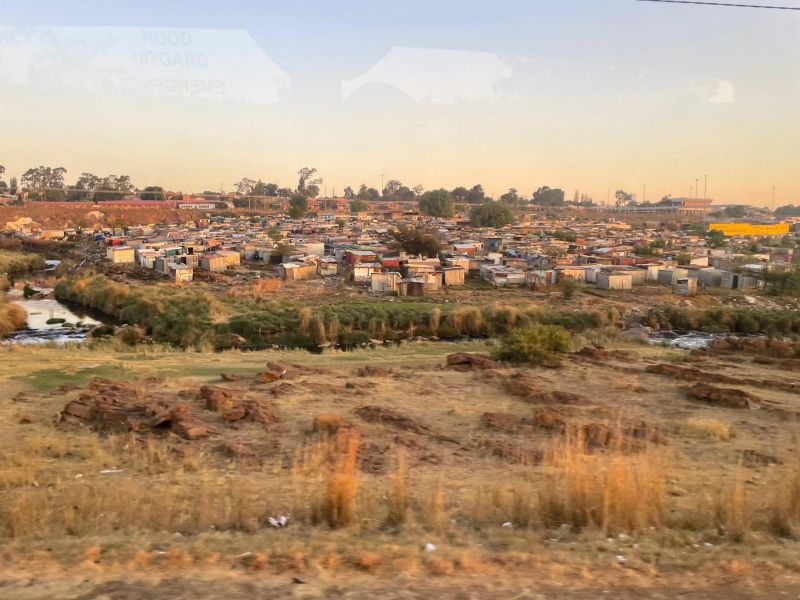
Soweto, South Africa
Vocabulary
uprising (n.): a violent or spontaneous protest or rebellion against authority
Example: The peasants started an uprising because they were unhappy with the king’s taxes.
student-led protest (adj.+n.): a public demonstration organized by students
Example: The student-led protest attracted hundreds of people who supported their cause.
(to) galvanize (v.): to cause people to take action or become excited about something
Example: The leader’s speech helped to galvanize the crowd into action.
anti-apartheid (adj.): opposed to apartheid, the policy of racial separation in South Africa until the early 1990s
Example: Nelson Mandela was an anti-apartheid activist who fought for equality.
June 17, 1885: The Statue of Liberty, a gift from France, arrives in New York Harbor, symbolizing freedom and friendship between the two nations.
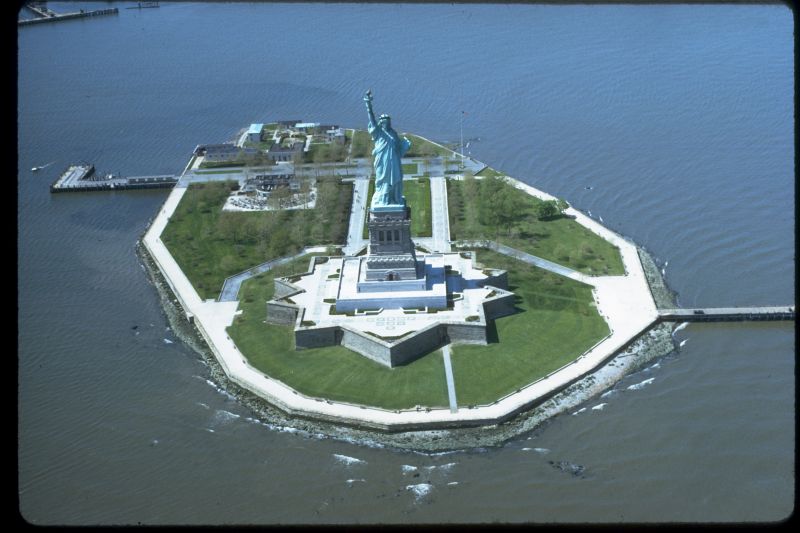
Statue of Liberty on Liberty Island
Vocabulary
Statue of Liberty (n.): a famous statue in New York City that symbolizes freedom and democracy
Example: Every year, millions of tourists visit the Statue of Liberty.
(to) symbolize (v.): to stand for or represent something
Example: The dove is often used to symbolize peace.
friendship (n.): a close and caring relationship between two or more people
Example: True friendship can last a lifetime.
June 18, 1815: Napoleon Bonaparte is defeated at the Battle of Waterloo by British and Prussian forces, ending his reign and reshaping European history.
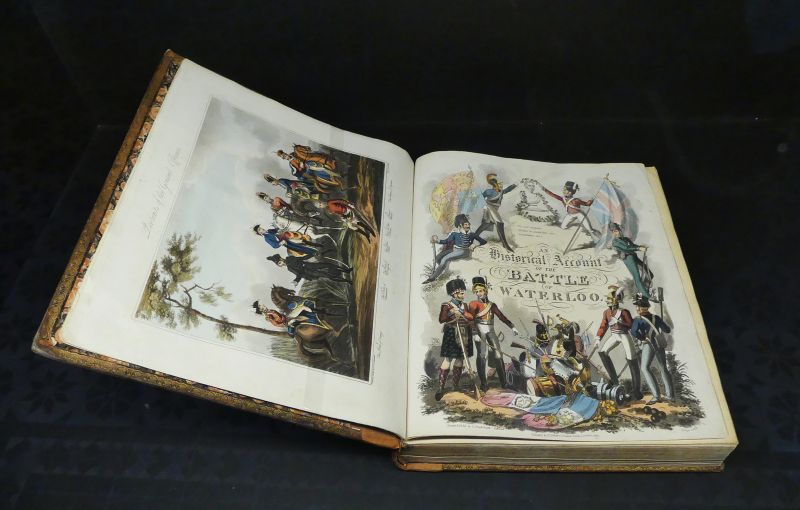
Victory at Waterloo: An Historical Account
Vocabulary
Napoleon Bonaparte (person): a French military leader who became emperor and conquered much of Europe in the early 1800s
Example: Napoleon Bonaparte was defeated at the Battle of Waterloo.
Battle of Waterloo (event): a major battle in 1815 where Napoleon Bonaparte was defeated by European allies
Example: The Battle of Waterloo marked the end of Napoleon’s reign.
Prussian (adj. / n.): related to Prussia, a historical German state
Example: The Prussian army played a key role in defeating Napoleon.
reign (n.): the period during which a king, queen, or emperor rules a country
Example: Queen Elizabeth II’s reign lasted more than 70 years.
(to) reshape (v.): to change the form or structure of something
Example: The new president hopes to reshape the education system.
June 19, 1964: The Civil Rights Act of 1964, banning discrimination based on race, color, religion, sex, or national origin, passes the U.S. Senate, a landmark in equality.
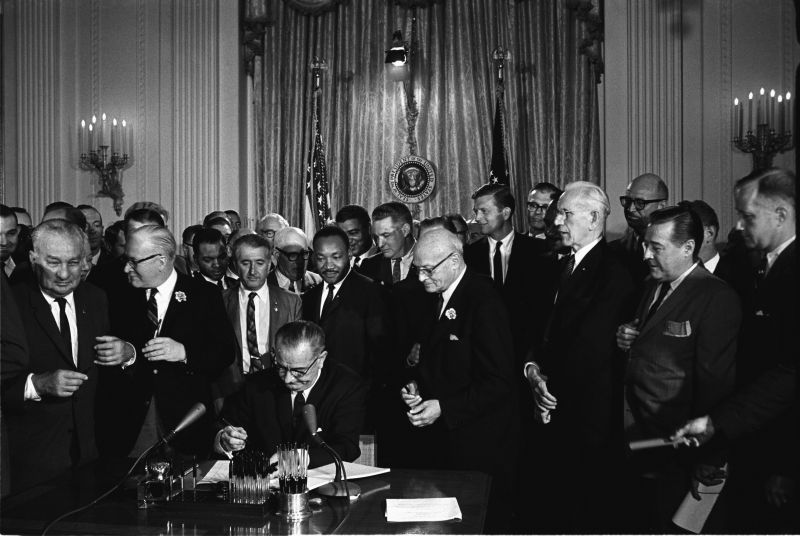
President Lyndon B. Johnson signs the 1964 Civil Rights Act
Vocabulary
discrimination (n.): treating someone unfairly because of their race, religion, gender, or other characteristic
Example: Laws have been passed to prevent discrimination at work.
national origin (adj.+n.): the country where a person or their ancestors come from
Example: Employers cannot discriminate against someone because of their national origin.
U.S. Senate (n.): one of the two houses of the United States Congress that makes laws
Example: The U.S. Senate voted to pass the new law.
equality (n.): the state of everyone being treated the same and having the same rights
Example: The civil rights movement fought for equality for all people.
June 20, 1975: Steven Spielberg’s Jaws premieres, revolutionizing the film industry as the first blockbuster and sparking widespread shark fascination.

Jaws movie poster
Vocabulary
(to) premiere (v.): to show or perform something, like a movie or play, for the first time
Example: The movie will premiere at the film festival next week.
(to) revolutionize (v.): to completely change something in a very new and important way
Example: The internet has revolutionized the way we communicate.
film industry (n.): the business of making and distributing movies
Example: Hollywood is the center of the American film industry.
blockbuster (n.): a very successful and popular movie, often earning a lot of money
Example: The latest superhero movie is a summer blockbuster.
fascination (n.): strong interest or attraction to something
Example: Children often have a fascination with dinosaurs.
4. GRAMMAR FOCUS

Simple Present Tense: Historians often describe the Battle of Waterloo as one of Europe’s most decisive battles.
Present Continuous Tense: Students are learning about Napoleon’s defeat at the Battle of Waterloo in their history class this week.
Present Perfect Tense: Many authors have written about the strategies Napoleon used at Waterloo.
Present Perfect Continuous Tense: Historians have been analyzing the Battle of Waterloo for decades.
Simple Past Tense: Napoleon lost the Battle of Waterloo on June 18, 1815.
Past Continuous Tense: Napoleon was preparing his army while the British and Prussians were advancing.
Past Perfect Tense: By the time the Prussians arrived, Napoleon had already engaged the British.
Past Perfect Continuous Tense: Napoleon had been trying to defeat the British all morning before the Prussians appeared.
Simple Future Tense: People will continue to remember the Battle of Waterloo as a turning point in European history.
Future Continuous Tense: Students will be studying the Battle of Waterloo in school next semester.
Future Perfect Tense: By this time next year, most students will have learned about Napoleon’s defeat.
Future Perfect Continuous Tense: By 2025, historians will have been researching this battle for more than 200 years.
First conditional: If Napoleon tries to fight a larger army, he will likely lose. (Real future possibility)
Second conditional: If I were a historian studying Waterloo, I would explore how different strategies could have changed Napoleon’s fate. (Imagined present situation)
Third conditional: If Napoleon had won the Battle of Waterloo, European history would have taken a very different path. (Unreal past situation)
5. QUOTE OF THE WEEK

“We have strong evidence today that studying a foreign language has a ripple effect, helping to improve student performance in other subjects.” – Richard Riley
6. ANSWER KEYS

Vocabulary Exercise
Read the definitions of words and phrases. Then complete each sentence with one of the bold words or phrases.
- monotheistic religion: a belief system that acknowledges the existence of only one god
- (to) face opposition: to encounter resistance or disagreement from others
- ruling class: a social group or elite that holds significant political or economic power and influences decision-making
- (to) rapidly spread: to quickly disseminate or extend over a wide area or among a large group of people
- within a century / decade / week / day / hour (of): indicates the timeframe within which a particular event occurred or is expected to occur
- significant impact (on): a substantial and influential effect on a particular situation or outcome
- Within a decade of the invention of the internet, it became a ubiquitous part of daily life.
- News of the discovery rapidly spread through social media.
- Social reformers often face opposition from those resistant to change.
- Christianity, Islam, and Judaism are examples of monotheistic religions.
- Changing your diet and exercising regularly have a significant impact on your health.
- The ruling class often determines policies and shapes the direction of a nation.
That’s it for English class this week! See you next Friday!
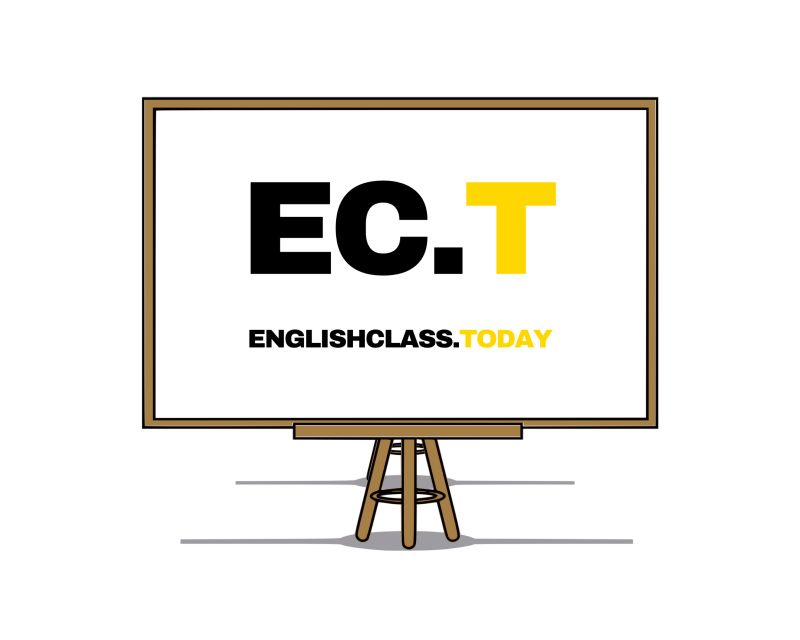
Did you enjoy this lesson? Support us to keep it free for everyone – click on the “Donate” button …
… or go to this page:
https://donorbox.org/english-class-this-week
 Donate
Donate